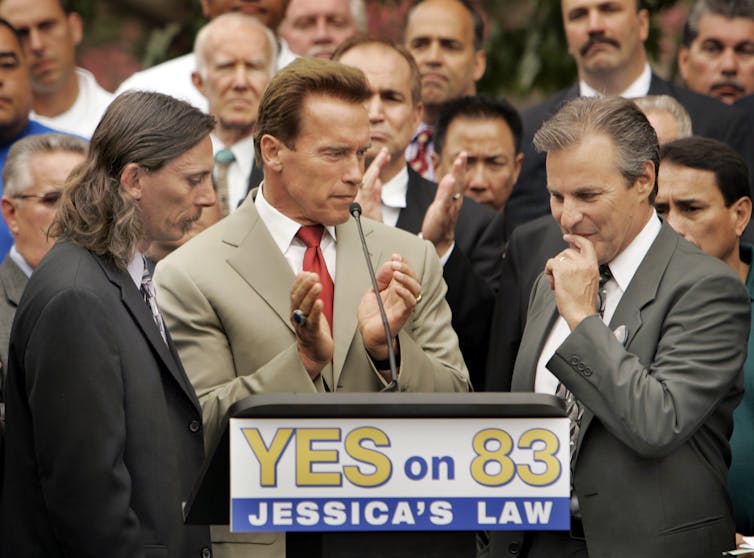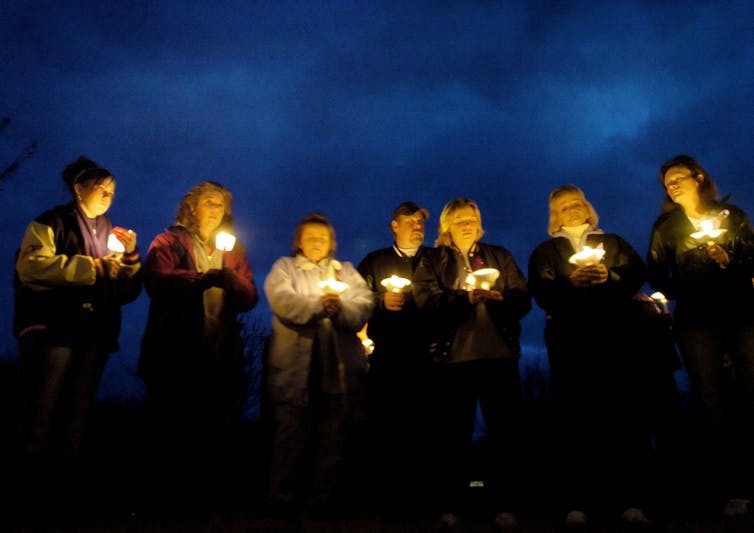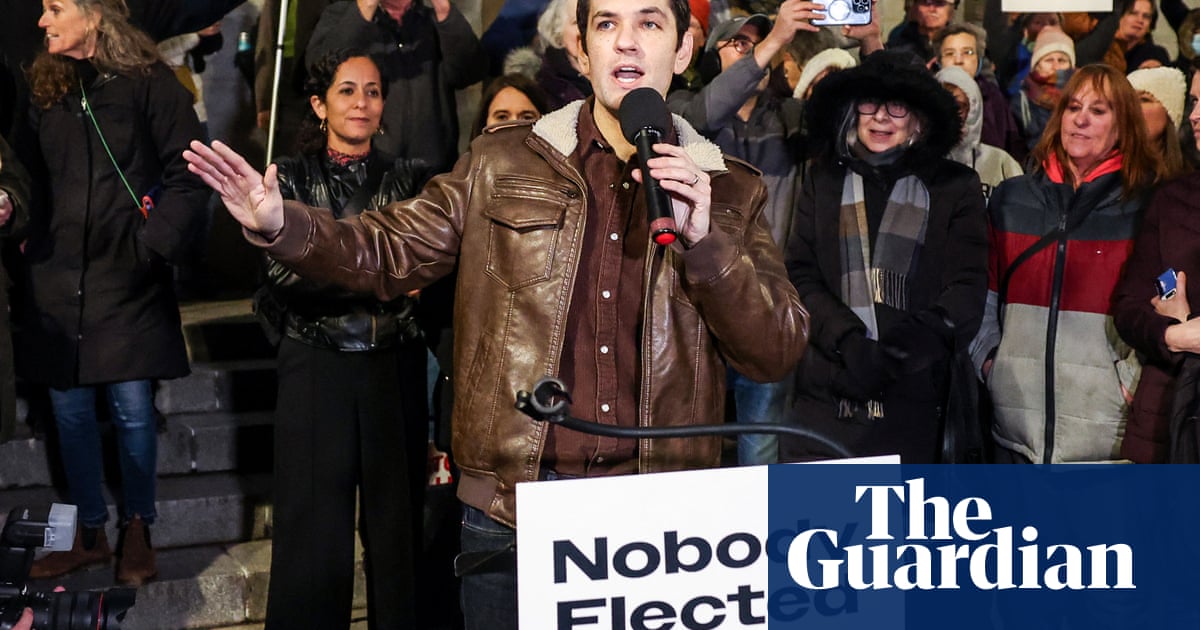Before his sentencing in March 2025, a convicted child rapist asked for a judgment that would have set him free in 2027. The Kansas resident received 25 years with no chance of parole.
The reason? Jessica’s Law, which Kansas lawmakers passed in 2006.
Kansas was one of the first states to follow Florida’s initial enactment of Jessica’s Law 20 years ago in response to the rape and murder of 9-year-old Jessica “Jessie” Lunsford in Homosassa, Florida. Forty-four other states have followed, altering how America polices, punishes and paroles pedophiles.
Although the law differs in some details from state to state, it generally directs judges to sentence people convicted of sex crimes involving children to a minimum of 25 years. Jessica’s Law also monitors offenders’ movements after prison and strives to keep them away from places where children congregate, such as schools and parks.
Many policymakers, prosecutors, defense attorneys and judges have protested key aspects of the law. They are particularly opposed to its strict minimum sentencing guidelines, which they’ve described as oversimplified and counterproductive.
Proponents, however, point to the law’s origins: Jessica’s February 2005 abduction, rape and murder by a repeat, convicted sex offender. They maintain the crime, which riveted the country for months and sent the third grader’s father, Mark, on a national child protection crusade, exposed deep-seated flaws in law enforcement and the legal system that made children around the country vulnerable to sexual assault.
Jessica’s Law remains mostly intact throughout the country. But it has come under scrutiny and has undergone changes. As a journalism professor who directed a documentary about Lunsford’s efforts to convince politicians to pass the law that bears his daughter’s name, I’ve kept up with its trials and tribulations.
Twenty years after Florida introduced the law, the jury is still out on whether America’s children are safer as a result.
‘Jessie’s Dad’
In making “Jessie’s Dad,” I filmed Lunsford visiting state capitals and Capitol Hill and interviewed many of his allies and detractors. I also reviewed interrogation footage and newsreels, attended the trial of John Couey – Jessica’s killer – and pored over proposed and passed bills, court transcripts and police records.
The resulting 2011 documentary highlights the law’s major perceived pros and cons.
The most glaring of the legal system’s shortcomings before Jessica’s Law, according to Lunsford and other activist groups, was lax treatment by the police and courts. That, they said, allowed many sex offenders who target children to roam free.
As Lunsford hopscotched from state to state to push for the law’s passage, he often noted that prior to raping and killing Jessie, Couey was convicted twice of molesting children but served only fractions of his sentences.
“One time they gave him (Couey) a 10-year sentence; he did two years,” Lunsford told me. “One time, he (Couey) broke into a house and assaulted a child, and he would’ve gotten more time had he stolen their silverware.”
Most of the states that have enacted Jessica’s Law direct judges to sentence child rapists to a minimum of 25 years in prison.
Besides mandatory minimum sentencing, most states that have passed Jessica’s Law require sex-offender parolees to wear a GPS monitor − something Couey never did.
Lunsford repeatedly pointed out that an electronic ankle bracelet, which tells the police the location of the person wearing it, could have led the police to Couey’s room in his sister’s trailer across the street from the Lunsford’s mobile home. That’s where Couey kept Jessie for three days before burying her alive in a backyard grave.

‘Romeo and Juliet’ provisions
In 2007, soon after Ohio passed its version of the law, Lunsford’s son Josh faced felony charges for fondling his 14-year-old girlfriend. The girl’s mother, who disapproved of their relationship, turned him in as soon as he turned 18 and became an adult in the eyes of the legal system. Josh ended up being charged with a misdemeanor, to which he pleaded guilty. He served 10 days in jail and 12 months under supervised release.
Reeling from this incident, the elder Lunsford advocated amending Jessica’s Law with so-called Romeo and Juliet provisions. These stipulations typically exempt most young adults from harsh sentencing when the age difference between them and their romantic teen partners adds up to fewer than four or five years.
Pennsylvania, the second state after Florida to pass Jessica’s Law in 2006, became the first to add a Romeo and Juliet provision in 2011.
Today, 44 states have likewise adopted similar provisions.
Legal challenges, too, have revamped parts of Jessica’s Law in some states. In 2015, for instance, California’s Supreme Court ruled the law violated the U.S. Constitution by infringing offenders’ liberty and privacy.
The law did so, the court determined, by universally ordering registered sex offenders to stay at least 2,000 feet away from schools and other places where children congregate. That meant they could not live within 2,000 feet of a school or places where children gathered.
Prior to the ruling, the Jessica’s Law residency restriction left many of California’s registered sex offenders with few viable housing options. It thus forced scores of them onto the streets and contributed to the Golden State’s homelessness crisis.
Critics have also noted it is difficult to monitor homeless pedophiles.
Although the California Supreme Court ruling technically applied only to San Diego County, it has spurred other parts of the state to restrict residency on a case-by-case basis.

Electronic tracking
Another divisive Jessica’s Law stipulation, however, may be too complex to simply modify.
When included in the original Florida law, electronic tracking appeared to hold great promise.
Today, 38 additional states electronically monitor sex offenders. Yet many accused and paroled sex offenders wearing ankle bracelets have nonetheless harmed children.
For instance, David Renz broke free of his GPS monitor in 2013 while awaiting a child pornography trial in New York and raped a fourth grader. He also killed the 10-year-old girl’s protector and school librarian, Lori Bresnahan.
While others harmed children after cutting off their ankle bracelets, some, like Arkansas resident Leontarius Reed, committed sex crimes while wearing GPS devices. Reed was wearing the device after a previous nonsexual offense.
Critics claim electronic monitoring numbs society into a misleading state of comfort. Others argue it’s better than losing track of sex offenders. They also say it deters crime and has saved countless lives.
Despite the widespread adoption of Jessica’s Law, comprehensive research is still needed to measure its impact. Such a project would examine whether America’s children are truly safer now than they were on May 1, 2005.

 German (DE)
German (DE)  English (US)
English (US)  Spanish (ES)
Spanish (ES)  French (FR)
French (FR)  Hindi (IN)
Hindi (IN)  Italian (IT)
Italian (IT)  Russian (RU)
Russian (RU)  3 weeks ago
3 weeks ago
























Comments